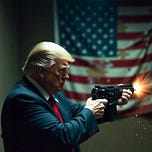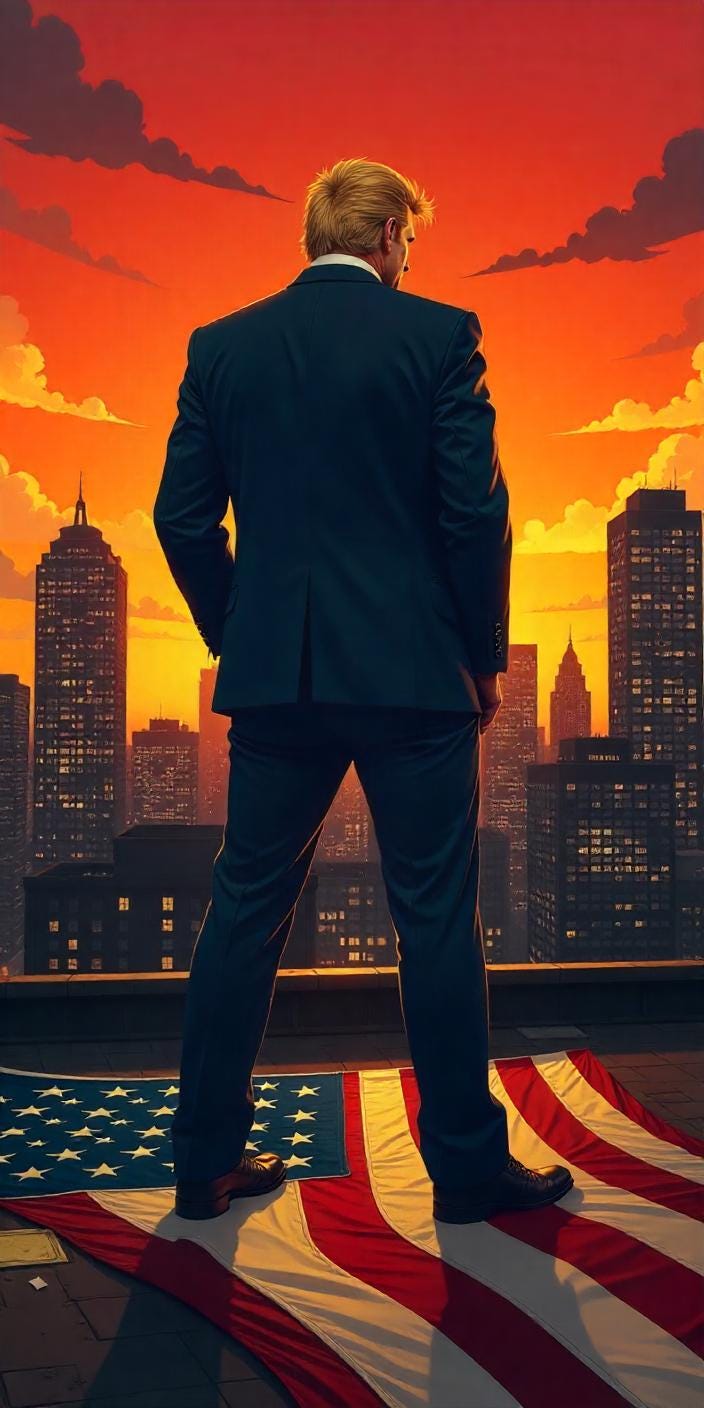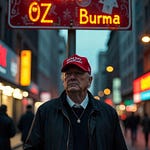When democratic leaders resort to military deployments on domestic soil without state consent, the nation enters perilous territory. What distinguishes a constitutional president from a despot is not merely legal formality, but restraint in power’s application. Since reassuming office in January 2025, Trump has not only continued but escalated his antagonistic posture toward dissenting states and opposition figures. His federalisation of the National Guard to intervene in Los Angeles, and the inflammatory declarations by Hegseth, together constitute an alarming reconfiguration of American democratic norms. This article evaluates these events through historical, legal, philosophical and comparative lense, arguing that they are emblematic of a systemic march toward authoritarianism.
The deployment of the National Guard under Title 10 of the U.S. Code, permitting federal command, has long been treated as an extraordinary measure. Its use bypasses state governors and hands direct control to the President. Under normal democratic conditions, it is invoked during catastrophic emergencies: foreign invasion, widespread insurrection or natural disaster. In contrast, Trump’s 2025 use of this authority is to intervene in local immigration-related protests in Los Angeles, an act that bares no proportionate threat to national security (Sky News, 2025; Al Jazeera, 2025).
Governor Gavin Newsom’s condemnation of the deployment reflects more than political grievance; it underscores a rupture in the federal compact. The National Guard, when used for domestic policing under presidential order, collapses the constitutional firewall between civil society and militarised state control. This is not just dangerous, it is despotic.
Pete Hegseth’s televised remarks about the Marines being on “high alert” for domestic deployment are not mere entertainment or hyperbole. As a former Army officer, his words contribute to what political theorist Jason Stanley calls “pre-authoritarian propaganda”, the rhetorical foundation for justifying violence as order and tyranny as leadership.
Despite lacking legal authority, Hegseth’s alignment with Trump’s vision grants his statements performative legitimacy. Authoritarian regimes frequently use surrogates to articulate their ambitions while retaining plausible deniability. From Joseph Goebbels’ media manipulation to Erdoğan’s use of loyalist broadcasters in Turkey, the strategy is well documented: let ideologues float extremist policies to test public tolerance, then follow with state action.
Legal scholarship has warned against the abuse of the Insurrection Act and Title 10 authorisations. Commentators like Stephen Vladeck and Oona Hathaway have emphasised the ambiguous thresholds these laws impose, allowing presidents to invoke vague notions of “unrest” or “obstruction” to federalise military force without checks (Protect Democracy, 2024).
The reconfiguration of executive authority under Trump reflects a deeper constitutional perversion. What was once a provision for civil stability has become a mechanism of centralised political control. Trump's legal manipulation mirrors the erosion seen in hybrid regimes like Hungary under Orbán, where emergency powers justified by refugee influxes became permanent fixtures of executive dominance. How many Americans would rejoice in being compared to Erdoğan or Orbán? They may soon be doing just this. By then it will be too late.
Hannah Arendt’s seminal insight, that violence signifies a collapse of power, rings truer than ever. Trump’s recourse to military deployment against domestic protest reveals not strength, but weakness: an inability to build consensus or command legitimacy through democratic means. Instead, force becomes a surrogate for authority.
Carl Schmitt’s theory of sovereignty as the ability to declare a “state of exception” (Schmitt, 2005) provides the authoritarian blueprint. When the executive defines the emergency and suspends legal norms, all power becomes concentrated in one office. Trump’s unauthorised deployment and Hegseth’s martial rhetoric follow this template exactly: law is no longer a framework, but an obstacle.
History provides chilling parallels. In 1973, Chile’s General Pinochet used military force, justified by “civil disorder”, to overthrow a democratically elected government. In the 1930s, Hitler invoked continual emergencies to consolidate personal control through Article 48 of the Weimar Constitution. More recently, Rodrigo Duterte in the Philippines and Recep Tayyip Erdoğan in Turkey used anti-terror and security laws to justify sweeping arrests, military interventions, and the dismantling of opposition institutions. Make note and worry, Trump has involved emergency measures/powers 9 times since he took office in January 2025. This is looking very much like Nazism of 1930s Germany.
Trump’s actions reflect this same autocratic logic: frame dissent as chaos, suspend normal constraints and consolidate power in the name of order. What makes this especially alarming in the American context is the strength of its democratic traditions, traditions now being bypassed by a President eager to impose federal authority over civilian governance.
Political scientists Steven Levitsky and Lucan Way have categorised “competitive authoritarian regimes” as systems that preserve the façade of elections and institutions but hollow out their integrity. Trump’s tactics mirror those observed in Viktor Orbán’s Hungary: use legalism to mask repression, leverage crisis to override opposition and employ loyal media to amplify fear narratives. An additional twist in the USA is Trump’s determination to extinguish media that inflame his all too fragile ego.
Unlike classic dictatorships, modern autocrats prefer legally-enabled coercion: they rule through a manipulated rule of law, not its abandonment. Trump's reliance on legal but ethically distorted tools, such as the Insurrection Act or emergency declarations, fits squarely within this model.
The synergy between Trump’s executive maneuvers and Hegseth’s martial declarations signals a deeper media-military complex. Far-right media serves not only as a communication tool but as a soft power battalion, shaping the narrative that makes military deployment seem necessary, patriotic or inevitable.
This form of “civil-military propaganda” normalises the idea of domestic enemies and valorises force over dialogue. Hegseth’s invocation of Marine readiness follows the blueprint laid out by fascist regimes, where symbols of national strength are turned inward to subdue domestic plurality.
From an ethical standpoint, the use of military force against a domestic civilian population violates core tenets of just governance. The Just War tradition, stretching from Aquinas to modern political ethics, insists that force must meet criteria of proportionality, discrimination and last resort. Trump’s deployment meets none of these standards. Nor does Hegseth’s public fantasy of Marine intervention, which treats protest not as political expression, but as insurrection.
Moreover, the erosion of these ethical boundaries is cumulative. Each normalisation of federal violence makes the next deployment easier. Democratic norms do not collapse all at once, they are eroded through repeated violations that go unpunished.
At the heart of the American republic lies a foundational principle: that sovereignty is shared. Power is not centralised in the federal government but is carefully divided between national and state jurisdictions. The Constitution was designed to protect this balance, to prevent the rise of a monarch or autocrat who could wield a standing army against the citizenry without consent. President Donald Trump’s use of the National Guard in Los Angeles together with the rhetoric by Hegseth suggesting that U.S. Marines could intervene in civilian affairs, strikes at the very core of this federalist compact.
Trump did not request collaboration with California's elected leadership. He did not appeal to Congress. He unilaterally mobilised armed force, overriding state authority and imposed military presence on a population governed by officials he did not elect and did not consult. This is not federal cooperation, it is federal occupation. It is not governance within a constitutional framework, it is the executive assuming powers that were explicitly denied to King George III in the Declaration of Independence.
By positioning himself as commander not only of federal institutions but of the actions of individual states, Trump effectively places himself above the sovereignty of those states. His assertion of power mirrors the very behavior that led the colonies to revolt in 1776. The use of military authority over a state without its consent is tantamount to a declaration of war against that state’s constitutional autonomy. When characters such as Hegseth indicate that the Marines will be activated to police civilian protests, it goes even further: it resembles military dictatorship by proxy.
This is not hypothetical. The 10th Amendment to the U.S. Constitution enshrines the sovereignty of the states by reserving all powers not delegated to the federal government. The deployment of federal troops without gubernatorial request or a legitimate constitutional trigger ignores this framework entirely. It nullifies the protective function of the 10th Amendment and turns the executive branch into a sovereign authority unto itself, effectively subsuming all levels of government beneath the will of one man.
Historically, this centralisation of coercive force in the hands of the executive has marked the death knell of democracy. Whether it was Julius Caesar crossing the Rubicon, Napoleon declaring himself Emperor or Hitler invoking a perpetual “state of emergency,” the pattern is consistent: the suspension of regional and legislative checks signals the transition from constitutional governance to personal rule.
Trump would do well to remember the ideological roots of the American experiment. The Founders risked their lives to declare that “governments derive their just powers from the consent of the governed.” In subordinating the state of California through force, Trump betrays that principle. His actions are not only a constitutional offense but a symbolic rupture with the spirit of 1776.
Moreover, if the President or his allies claim the right to deploy Marines, who are trained not for civilian law enforcement but for warfare, on domestic streets, what remains of the distinction between democracy and military autocracy? The use of troops on American soil, outside the express consent of state leadership and without Congressional authorisation, transforms civil governance into rule by intimidation.
This is not just a policy overstep. It is a redefinition of the republic. It signals that the executive now views state sovereignty, democratic consent and constitutional process as optional. It suggests that force, not law, is the preferred mechanism for resolving disputes with political opponents. It raises the most harrowing of historical echoes: that America’s 21st century descent into despotism may arrive not through a coup, but through the slow erosion of federalism, under the guise of “order, and the deployment of military force against its citizens.
The return of Trump to the presidency in 2025 did not bring with it a reversion to traditional norms. Instead, it marked the escalation of an authoritarian playbook already in motion. The federalisation of the National Guard in Los Angeles, bypassing state authority and democratic dialogue, is a tactical rehearsal for executive impunity. Pete Hegseth’s militarised fantasies offer the cultural narrative to match.
Together, they represent a fusion of power and propaganda that challenges the most sacred tenets of American democracy. If left unchecked, this moment may be remembered not as an aberration but as the threshold past which democratic rule gave way to militarised governance.
The United States stands at a precipice. What happens next depends not only on courts and legislatures but on citizens’ willingness to reject the normalisation of authoritarianism masquerading as law and order.
References
Arendt, H. (1970). On Violence. Penguin Books.
Schmitt, C. (2005). Political Theology: Four Chapters on the Concept of Sovereignty. University of Chicago Press.
BBC News (2025). Trump sends in the National Guard. https://www.bbc.co.uk/news/live/cvg7vxx888kt
Al Jazeera (2025). Trump deploys National Guard to quell protests. https://www.aljazeera.com/news/2025/6/8/trump-deploys-national-guard-to-quell-protests-against-ice-in-los-angeles
Sky News (2025). Trump: State officials 'can't do their jobs'.https://www.google.com/url?q=https://news.sky.com/story/national-guard-to-be-deployed-to-la-immigration-riots-as-trump-claims-state-officials-cant-do-their-jobs-13380613&sa=D&source=docs&ust=1749398728094716&usg=AOvVaw0IbZSkoBRtVYBxPv0HWP_q
Irish Star (2025). Hegseth warns Marines on high alert.https://www.irishstar.com/news/us-news/hegseth-warns-marines-high-alert-35355754.amp
Protect Democracy (2024). The Insurrection Act and National Guard Authorities.https://protectdemocracy.org/work/domestic-deployment-military-explained/
Congress.gov. (n.d.). Defense Primer: Military Use of Force.https://www.congress.gov/crs-product/IF10539
National Guard (n.d.). Guard FAQs. https://nationalguard.com/guard-faqs
Kingma Neu, K. (2022). "Strategies of Dictatorship." Journal of Global Security Studies, 7(1). Link
Tusalem, R. (2023). "The Dictator’s Legionnaires." Defence and Peace Economics. Link














Share this post